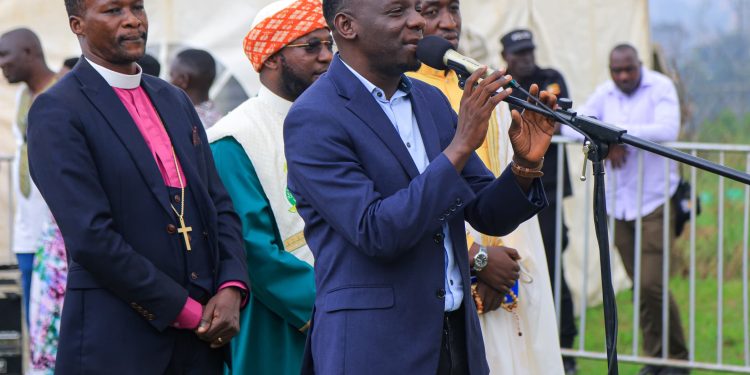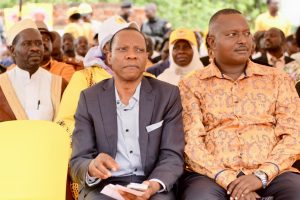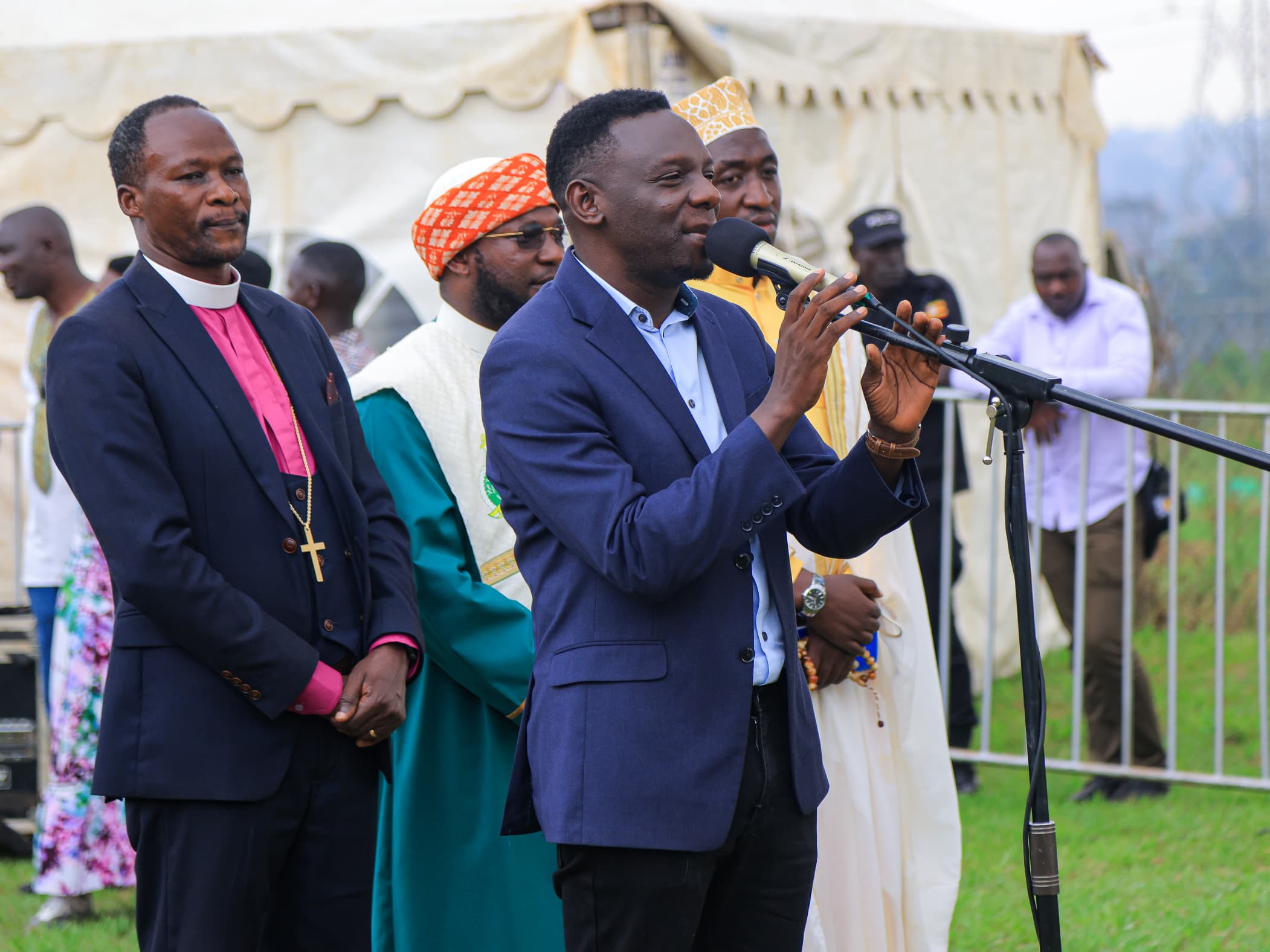Thursday, 29 January 2026
Pastor defends his wife for emulating Whores: Jamal Bryant slammed for buying wife flesh-colored gala dress: 'Lowering of standards'
Tuesday, 27 January 2026
Museveni Rigs his way to a 7th term in Office: Human rights observers Declare Uganda’s 2026 Presidential Election a Sham
Uganda: Authorities Must Desist from Attacks on Civic Space and Investigate 2026 Electoral Period Violations
The Robert & Ethel Kennedy Human Rights Center strongly condemns the violence, repression, and serious human rights violations that took place during and following the just-concluded general elections in Uganda. We call on the Ugandan authorities to desist from all forms of violence and intimidation; respect the rights of all citizens, including opposition politicians and their supporters; and promptly investigate these egregious violations.
On January 15, 2026, Ugandans went to the polls in an election that was marked by significant rights violations. In the lead-up to the elections, Ugandan authorities targeted human rights defenders, journalists, opposition figures, and civil society organizations through arrests, harassment, and restrictive administrative measures. On election day, the Government shut down nationwide internet connectivity, blocking the world from what transpired during the elections and cutting off access to information and independent reporting on the electoral process. Internet access was restored only after President Museveni was declared the winner with nearly 72% of the vote, against 25% for opposition leader Bobi Wine. Opposition parties have rejected the outcome and called for peaceful protests in response to what they described as widespread irregularities and the absence of conditions necessary for a free and fair election, alleging ballot stuffing, voter intimidation, and the blocking of party agents from polling stations.
Electoral violence escalated sharply following election day. Security forces reportedly used live ammunition and excessive force against opposition supporters, with the government confirming at least seven deaths and dozens injured across several districts. These figures have been disputed by the opposition, which claims that about 100 people were killed on election day.
President Museveni’s nearly four decades in power have been characterized by systemic restrictions on democratic freedoms, repression, and violence against political opponents. Across election cycles, Uganda’s elections show a consistent pattern of violence, intimidation, and state repression, particularly targeting opposition supporters, journalists, and civil society. These trends intensified in the 2021 elections, marked by severe repression, including the use of lethal force by security agencies and nationwide internet shutdowns.
The events surrounding the 2026 elections reflect a troubling continuation of this pattern and risk further entrenching authoritarian rule while eroding public confidence in democratic institutions. This atmosphere of repression has also been reflected in the continued judicial harassment and detention of opposition figures. Veteran opposition leader Kizza Besigye has spent more than a year in custody on treason and related charges, which his lawyers and political allies describe as politically motivated. His family has raised growing concerns regarding his deteriorating health while in detention. Following the elections, the movement of opposition party agents, observers, and supporters was obstructed, and many were arrested. Bobi Wine, the main opposition candidate, was placed under de facto house arrest and was later forced into hiding after escaping a police raid at his home. Two senior members of his party, the National Unity Party, were abducted by security forces and remain missing.
We urge the Ugandan authorities to immediately end all violence and intimidation against civilians; release all individuals arbitrarily detained for exercising their political rights; ensure independent, transparent investigations into all reported killings and abuses; restore full access to the social media platform; and guarantee a credible, impartial process for resolving electoral disputes in line with Uganda’s constitutional and international obligations.
Monday, 12 January 2026
Uganda's Bogus Neo-liberal System and the Neglect of Doctors who save life: Uganda’s first female orthopaedic surgeon Dr. Jamirah Namusoke seeks Shs200m for kidney transplant
Uganda’s first female orthopaedic surgeon seeks Shs200m for kidney transplant
Saturday, 10 January 2026
Protecting the Looted Gains: Pastors Kayanja Robert, Tom Mugerwa, Jackson Senyonga and Bugingo Aloysius Openly campaign for Dictator Museveni: Ugandans lambast them severely.
MUST WATCH:
Ugandan Pentecostal Pastors At Museveni’s NRM Rally In Lubaga
https://www.youtube.com/watch?v=i_KEkJ7R0us
Pastor Kayanja Says Museveni’s Seventh Term Will Be a Season of Completion
7th January 2026 at 10:23 10:23 am
The Founder and Senior Pastor of Miracle Centre Cathedral, Pastor Robert Kayanja, has said President Yoweri Kaguta Museveni’s anticipated seventh term will mark a season of completion and perfection of the work he has undertaken for Uganda since coming to power over four decades ago.
Pastor Kayanja made the remarks yesterday during the climax of President Museveni’s campaign tour of Rubaga Division. The rally, held at Kitebi Primary School, drew massive crowds.

One of Uganda’s most prominent and widely followed Pentecostal leaders, Pastor Kayanja was among three faith leaders invited to offer opening prayers after the President arrived at the venue at around 4:45 p.m.
He opened by reading from 1 Kings 5:14, recounting the biblical story of Naaman, the Syrian army commander healed of leprosy after dipping seven times in the River Jordan, in obedience to the prophet Elisha. Speaking in his trademark prophetic style, Pastor Kayanja said President Museveni’s seventh term would mirror this biblical symbolism, a period in which all the good works he has initiated for Uganda would be completed.
“Seven is a very symbolic number in the Bible and before God,” Pastor Kayanja said. “This being President Museveni’s seventh term, it signifies divine favour, enabling him to complete the work he began for Uganda forty years ago.”
He also reminded the audience that President Museveni’s leadership has guaranteed freedom of worship in Uganda, allowing citizens to practice their faith without restriction, urging supporters to consider this as a reason to back the President for another term.
Other religious leaders who delivered opening prayers included the District Khadi of Rubaga Muslim District, Sheikh Jamil Kassim Ntambi, and the Provost of Mengo Diocese, the Rt. Rev…
The rally attracted unprecedented attendance, with crowds filling Kitebi Primary School and spilling into the surrounding streets near Muteesa II Royal Stadium in Wankulukuku.

Wilson Bugembe On Why M7 Deserves Victory on 15th Jan
https://mulengeranews.com/wilson-bugembe-on-why-m7-deserves-victory-on-15th-jan/
By Walakira John
At the commencement of NRM Presidential Candidate YK Museveni’s campaign rally for Wakiso district, that was venued in Nansana Municipality on Tuesday, renowned gospel singer and pastor Wilson Bugembe openly campaigned for the incumbent President’s re-election.

Pastors Jackson Ssenyonga (L) and Aloysius Bugingo (R) seated together at the Museveni rally in Kawempe where they openly endorsed NRM and prayed for his victory come Thursday 15th January.
Many ordinarily expected him to be a supporter of Bobi Wine with whom they share a lot in common including being fellow musicians, members of Mbogo/buffalo clan and musicians who have even done collabos together before.
When it was his time to pray for the President and the Movement at the beginning of the rally (many other clerics were there & prayed too), Bugembe revealed that he was here because he had received a phone call from the President at 5am imploring him to come for the rally in his capacity as one of the prominent Nansana Municipality residents.
Before praying as requested, Bugembe requested the President, the First Lady and all the other attendees to stand up first in honor of the Good Lord who he said had gifted Uganda with such a wonderful leader. He said that the great things Museveni had done for Uganda in the last 40 years can only be done by someone who is divinely inspired.
That as a young boy from Masaka, where he was orphaned by HIV Aids, he (Bugembe) was raised by a grandmother who he said kept telling him about Uganda’s past which was synonymous with wars and endless political instability. “I grew up with that phobia but I’m here to thank God that I have grown and lived in Uganda for 40 years now and I haven’t seen nor experienced war in my entire life.”
As he spoke, the First Lady Janet Museveni, his fellow Mulokole, seemed happy and impressed as she smiled from ear to ear, with her face beaming with blessedness. Bugembe indeed paid personal tribute to her thanking God for gifting Uganda with such a decent First Lady who he commended for emotionally supporting the President and making it possible for him to do wonders for the country. He also appreciated her Godliness.
Bugembe also explained why he would eternally be personally grateful to Gen Museveni. He said he was just 19 years when he first set out to start his Worship House church ministries in Nansana. That the area local authorities had blocked the project asserting that he was too young and uneducated.
But that hurdle was overcome when the late Joyce Mpanga (a one time NRM Minister) came around and intervened; making it clear to the local authorities in Nansana that, as far as the President of the country was concerned, there was nothing wrong with a group of uneducated youths coming together to start a church to be able to worship their God.
Bugembe told the gathering and the attentively listening first couple that Mpanga quoted the Bible and made references to many great post-ascension early builders of Christianity who did great things and preached the gospel to evangelize the world even when they hadn’t gone very far with formal education.
Bugembe added that, as a man of God, he is convinced that Gen Museveni is genuinely a believer at heart because he couldn’t have allowed his daughter, Patience Rwabwogo, to become a pastor and found a Church.
“Uganda is the only country that I know in the world with a President who publicly confesses, worships and prays to the living God. Even one of his daughters is a Pastor.” Bugembe said every Ugandan should pray for Museveni’s victory come 15th January.
On the same day, at another rally, two other Bugembe’s fellow big-name pastors (namely Aloysius Bugingo and Jackson Ssenyonga) equally praised Museveni and prayed for his 15th January victory during a separate rally for Kawempe Division that was held at Kawempe Mbogo grounds.
At the Wakiso district rally in Nansana Municipality, where Bugembe spoke from, other clerics from Wakiso, including Muslim Sheikhs, were present and equally prayed for Gen YK Museveni’s victory. They also asked to be favored to at least take a group photo with the big man from Rwakitura.
Rose Sseninde, who heads mobilization at the NRM Secretariat and is also a former woman MP for Wakiso (did 20 years without break), thanked Gen Museveni for rescuing 400 acres of land in Kira Municipality’s Kasokoso (removed from National Housing & Construction Corporation), which has since been donated to hitherto tensed-up village residents each one of whom has also been given a land title to evidence the fact that the land is now theirs in perpetuity.




